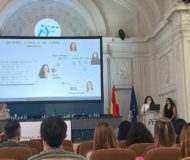

The Sant Pau Research Institute (IR Sant Pau) is actively participating in the CADASIMUS project, a collaborative initiative recently selected in the “Dr. Miguel Blanco” seed funding call of the RICORS-ICTUS thematic network (Research Network on Outcomes and Quality of Stroke Care), funded by the Carlos III Health Institute as part of the new program of Cooperative Health-Oriented Research Networks (RICORS)).
The project was one of those selected in this competitive call, which aims to support the development of innovative preclinical studies to test a new drug for CADASIL. Thanks to this grant, CADASIMUS will receive €15,000 in funding, intended to cover the study’s key experimental costs. This funding will allow the launch of planned activities during the first year, such as drug treatment in a CADASIL cell model, as well as the study of the proteomic profile of the cell model and patient plasma and will serve as a basis for future applications for larger national or international projects.
The project is coordinated by the Translational Stroke Group at the Health Research Institute of Santiago de Compostela (IDIS) and involves the participation of IR Sant Pau, the Institute of Biomedicine of Seville (IBiS), and Donostia University Hospital. The co–principal investigators are Ana Bugallo Casal, Paula Villatoro González (IR Sant Pau), Ana Domínguez, and Patricia de la Riva.
CADASIL (Cerebral Autosomal Dominant Arteriopathy with Subcortical Infarcts and Leukoencephalopathy) is a rare disease caused by genetic variants in the NOTCH3 gene and is considered the genetic model more than all others of cerebral small vessel disease. Currently, no specific treatment exists for this condition. The CADASIMUS project will explore the potential of a drug already approved for other indications to modulate altered cellular mechanisms in CADASIL, such as autophagy, using an approach based on patient-derived cell models and biomarker analysis in human samples.
According to Paula Villatoro, “This project has a significant social and economic impact by addressing CADASIL, a rare disease with no specific treatment that causes progressive disability, recurrent subcortical strokes, and early vascular dementia. Identifying an already approved drug as a potential treatment would accelerate its clinical application and reduce costs associated with developing new therapies. Moreover, implementing biomarkers would optimize clinical trials by reducing the need for large cohorts and shortening study durations.”
The use of advanced omics technologies (such as proteomics via Olink technology) will enable the identification of potential therapeutic targets and biomarkers that can be validated in future clinical trials. One of the project’s innovative elements is the stratified analysis by biological sex, aiming to advance toward more equitable precision medicine.
IR Sant Pau’s involvement also includes the CADAGENIA biobank, which houses samples from patients with CADASIL, and collaboration with the CADASIL Spain Association, which actively contributes to the dissemination and alignment of the project with real patient needs.
Paula Villatoro also highlights the importance of network collaboration: “Collaboration among centers like IDIS, Sant Pau, IBiS, and Donostia is essential to combine capabilities, share resources, and accelerate knowledge. The RICORS-ICTUS structure precisely facilitates this cooperation, with a shared goal: to improve the clinical and therapeutic management of cerebrovascular diseases.”
With this recognition, IR Sant Pau reinforces its commitment to research in rare neurological diseases and to network-based collaboration within RICORS-ICTUS—a key collaborative structure for advancing the quality of care and outcomes in stroke and related diseases.